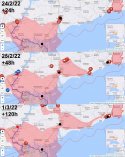We're dancing to the US tune when we restrict ourselves to a Taiwan scenario that is both limited in scope and imminent. There's no indication China's planning any such contingency, certainly not a war over Taiwan waged to the US's liking. The US media hyping such a war is just a symptom of the US's complex of delusions and its attempt to negate reality's intrusion into those delusions.
The fundamental dynamic to consider here is that China's position in the broad conflict with the US - not just over Taiwan - strengthens over time while the US's weakens, and despite the best ill-wishes of Western analysts these trends will continue into the indefinite future.
Given this, why would China have a fight today where it must necessarily limit the scope of said fight and endure severe hardship when it can simply push the fight to tomorrow when it will have overwhelming dominance and be assured victory at minimal cost, even in a war of greatly expanded scope? Anyone can see that the move to play is to postpone the fight to tomorrow.
The only sound objection to this is that it's not China's choice alone and that the enemy gets a vote too. But here we are fortunate in that the enemy is the US and the enemy's hallmark is self-deception. The US will not start a war against a foe who can hurt it; it will just comfort itself with delusions that its enemy will just collapse from within, which is why we see the increasingly fevered proclamations of China's long-term economic stagnation if not collapse.
The idea of Taiwan making a move on its own is beneath consideration. I only raise it here because it technically exists in the space of logical possibilities.
I don't think a Taiwan scenario that doesn't involve H-20 strikes on Hawaii and Type 09-V and intercontinental HGV strikes on military-industrial sites on the US mainland is a Taiwan scenario worth considering. That's bare minimum. Even if you think the war should be limited in scope, you have to consider the possibilities for escalation and ensure you have dominance in all of them. China must be prepared to confront a fully united, fully committed, fully prepared US and still be strong enough to beat it into submission. So strong that it isn't even close.
The only PLA landing on Taiwan in a well-planned scenario should be one soldier carrying the instrument of surrender for whatever's left of a government there to crawl out of the rubble and sign.
The fundamental dynamic to consider here is that China's position in the broad conflict with the US - not just over Taiwan - strengthens over time while the US's weakens, and despite the best ill-wishes of Western analysts these trends will continue into the indefinite future.
Given this, why would China have a fight today where it must necessarily limit the scope of said fight and endure severe hardship when it can simply push the fight to tomorrow when it will have overwhelming dominance and be assured victory at minimal cost, even in a war of greatly expanded scope? Anyone can see that the move to play is to postpone the fight to tomorrow.
The only sound objection to this is that it's not China's choice alone and that the enemy gets a vote too. But here we are fortunate in that the enemy is the US and the enemy's hallmark is self-deception. The US will not start a war against a foe who can hurt it; it will just comfort itself with delusions that its enemy will just collapse from within, which is why we see the increasingly fevered proclamations of China's long-term economic stagnation if not collapse.
The idea of Taiwan making a move on its own is beneath consideration. I only raise it here because it technically exists in the space of logical possibilities.
I don't think a Taiwan scenario that doesn't involve H-20 strikes on Hawaii and Type 09-V and intercontinental HGV strikes on military-industrial sites on the US mainland is a Taiwan scenario worth considering. That's bare minimum. Even if you think the war should be limited in scope, you have to consider the possibilities for escalation and ensure you have dominance in all of them. China must be prepared to confront a fully united, fully committed, fully prepared US and still be strong enough to beat it into submission. So strong that it isn't even close.
The only PLA landing on Taiwan in a well-planned scenario should be one soldier carrying the instrument of surrender for whatever's left of a government there to crawl out of the rubble and sign.



